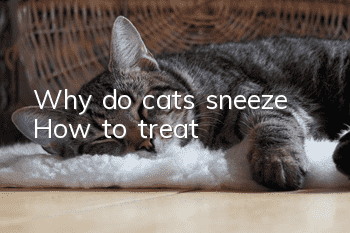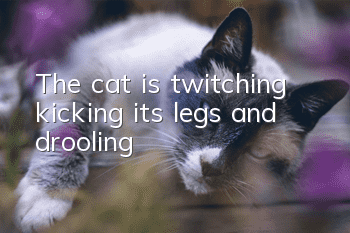Why do cats sneeze? How to treat?

All animals with noses sneeze. Occasionally sneezing is a healthy reflex to clear irritating little things from your cat's nose. However, it is not normal for a cat to sneeze constantly. This article explains the common reasons cats sneeze and what to do when your cat starts sneezing.
What is sneezing?
Everyone knows what a sneeze is, but there's a definition that helps us explain exactly what's happening. Sneezing is a reflex in response to irritation of the lining of the nasal cavity. This reflex begins with a slow intake of air into the lungs, followed by a sudden, forceful expulsion of air quickly through the nose. When you sneeze, any small, loose particles in the nasal cavity have the potential to be quickly expelled into the surrounding environment.
Why cats sneeze
Anything that irritates the lining of the nose can cause sneezing. Let’s look at these most common reasons.
Viruses: Feline herpes virus (FHV) and feline calicivirus (FCV) are the most common upper respiratory tract infections (URI) in cats (commonly known as "cat flu") and are one of the most common causes of sneezing in cats. If caused by a virus, sneezing is often accompanied by other symptoms of a viral infection such as loss of appetite and eye discharge due to conjunctivitis. Other viruses, such as feline leukemia virus (FeLV) and feline immunodeficiency virus (FIV), can also cause sneezing.
Infection: Bacteria such as Burdella bronchiscens, mycoplasma, or chlamydia can sometimes cause cats to sneeze. Fungal infections are occasionally seen in some parts of the world. Parasitic infections rarely cause nasal discomfort in cats.
Allergies and Irritation: Airborne irritants, such as some deodorant sprays, can sometimes cause sneezing. Cats may also sneeze due to allergies to airborne particles such as pollen, dust, cigarette smoke, etc. Foreign objects are another common cause of sneezing. Sneezing can be triggered by blades of grass or any small object that is inhaled or swallowed and then regurgitated.
Other causes: Sneezing may also be associated with other conditions, including:
Nasopharyngeal polyps are inflammatory wart-like growths that can grow from the inner wall of the nasal cavity and cause local irritation
Nasal tumors are a rare cause that is common in adult cats, especially older cats
Abscesses in the roots of maxillary teeth can impinge on the nasal cavity, causing irritation, sneezing, and other symptoms such as drooling or mouth pain
Congenital anomalies, such as cleft palate, are rare causes of sneezing in kittens and kittens
Idiopathic lymphocytic plasmacytic rhinitis is an inflammation of the lining of the nose with unknown cause.Related to the cat’s immune system
Why do cats sneeze?
As mentioned above, there is a long list of reasons why cats can sneeze. In order to determine the cause specific to a particular cat, a series of investigations may be necessary.
1. Historical reasons
As a first step in the investigation, the veterinarian will want to ask questions about the cat's health history. Historical questions about cat health include:
How often do cats sneeze? It's normal for cats to sneeze occasionally, just like it's normal for humans to sneeze.
How long has your cat been sneezing?
Are there other symptoms besides sneezing in cats, such as wheezing, coughing, or other symptoms listed above?
Does the cat have any other health problems?
How old is the cat? (Some causes are more common in kittens, while others are more common in older cats)
Has there been any change in the cat’s living environment? Are there new cleaning products, perfume, furniture, flowers, cat litter or litter boxes, a new humidifier, or anything else that might be bringing airborne irritants or allergens into your home?
Does the cat spend a long time outdoors?
Has your cat been vaccinated against FHV and FCV?
Has your cat had any recent veterinary exams, including dental exams?
Are there any signs of dental disease, such as bad breath, drooling, or mouth pain?
Do you give your cat antiparasitic treatments regularly?
Has your cat been in contact with other cats?
Is your cat showing other signs of being unhealthy?
Is your cat showing signs of a runny nose? If so, is the snot bloody and transparent?
2. Physical examination
Why do cats sneeze? How to treat?
Why do cats sneeze? How to treat?
After taking a detailed medical history, the veterinarian will perform a detailed physical examination, taking the cat's temperature, listening to the chest with a stethoscope, and examining the head, mouth, and nose.
3. Diagnostic imaging
X-rays of the skull and nasal cavity may be taken, which can help diagnose problems such as nasal tumors or dental abscesses. If more detail is required, further imaging, such as a CT or MRI scan, can be performed.
4. Blood sample
Routine analysis using biochemistry and hematology can collect baseline data about your cat's general health.
5. Rhinoscopy
Rigid or flexible endoscopes can be used to see directly into catsThe lining of the nasal cavity.
6. Biopsy
A sample of the secretion can be collected, or a tissue biopsy can be taken from the lining of the nose and sent for laboratory analysis. Swabs may also be taken for bacterial or viral isolation.
Cat sneezing treatment
The type of treatment needed depends entirely on the cause of the sneezing, which is why an accurate diagnosis is so important. Possible treatments include:
Irritating foreign bodies
Surgical resection of nasopharyngeal polyps
Antibiotics used to treat primary or secondary bacterial infections
Antifungal drugs for specific fungal infections
Antiparasitic drugs that target specific parasitic infections
Anti-inflammatory drugs for certain inflammatory diseases, such as idiopathic lymphocytic plasmacytic rhinitis
Surgery and chemotherapy for nasal tumors
Conclusion
If your cat starts sneezing more than normal, it is best to take them to your local pet hospital for a thorough investigation to determine the cause. This way, the specific cause of the sneezing can be determined early this morning to avoid delaying normal treatment.
- There is a hard thing on the cat's chin
- How do novices choose cats? Don’t just look at the coat color!
- Can pet cats eat rice? Will cats have diarrhea if they eat rice?
- What do cats’ meows mean?
- What age is the best age for male cats to be neutered?
- What should a cat eat when pregnant?
- What should I do if my cat is dehydrated?
- What do blue cats eat when they are teething?
- Can cats use toilet water?
- Pregnant cat always rubs against you



